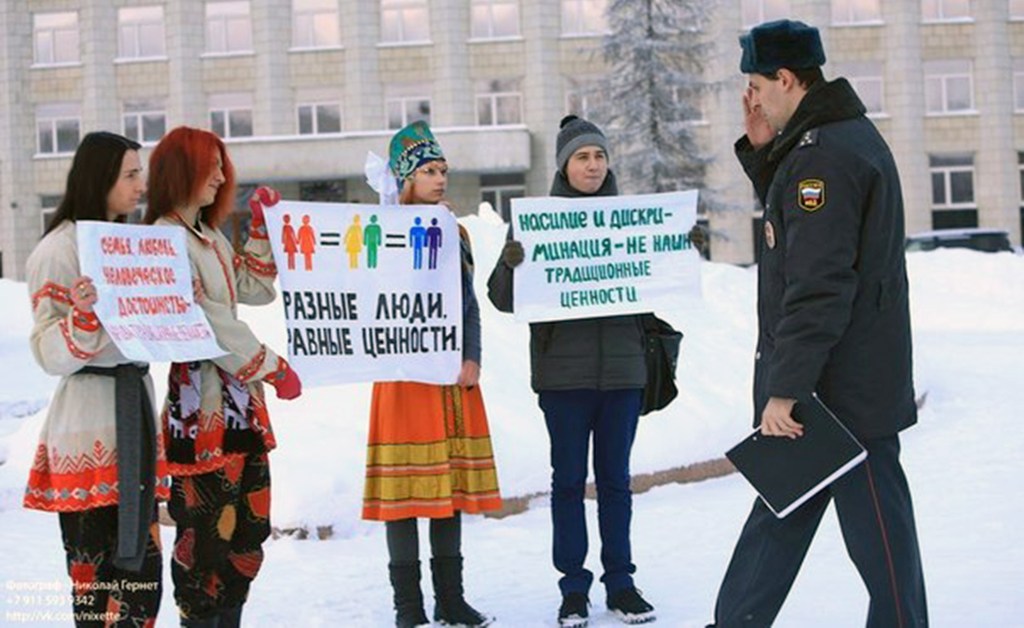Two years ago, lawmakers in the regional Archangel Assembly in northern Russia approved an anti-gay law that became a model for a federal law criticized around the world by human-rights groups.
Archangel, known as Archangelsk in Russia, happens to be a sister city of one of the most gay-friendly cities in the United States: Portland.
Gay-rights activists have pressured cities around the world to sever ties with their Russian sister cities. In Italy, Venice, Milan and Turin have already canceled sister-city programs with St. Petersburg. In August, the city council of Lansing, Mich., voted to sever ties with St. Petersburg. Chapel Hill, N.C., Ann Arbor, Mich., Chicago and Los Angeles have considered cutting ties with their sister cities.
Portland Mayor Michael Brennan said Thursday that he and other city officials considered ending Portland’s 25-year relationship with Archangel earlier this year but decided Portlanders would have more influence on the issue by maintaining the connection.
“We decided it is best to have a relationship and continue to have a dialogue,” he said.
Portlanders will have two opportunities this month to test Brennan’s approach.
On Nov. 16, a delegation of more than a dozen Russians, including government officials and three high school students, will come to Portland to celebrate the 25th anniversary of the “Treaty of Friendly Ties,” which established a sister city relationship between Archangel and Greater Portland.
On Friday, Liudmila Romodina and Oleg Klyuenkov, members of a gay-rights group in Archangel called Perspective, will arrive in Portland as part of a separate trip funded by Human Rights First.
Romodina works with a group of parents in Archangel who have gay children. Klyuenkov is a university professor. Their trip is not part of the sister-city relationship. It’s being organized by Robert Lieber, a Peaks Island resident who is involved in efforts to help members of the Pussy Riot rock group who are imprisoned for dancing near the altar of one of Moscow’s Russian Orthodox cathedrals.
Lieber said he spoke with Brennan and City Councilor Edward Suslovic nearly a year ago about whether the city should consider severing ties with Archangel, and they convinced him that “engagement” with the Russians would be more helpful.
He said many people in Portland’s gay community are excited about meeting the Russian activists. “One of the goals is to have some bonding experiences and have something that develops that feels real,” Lieber said.
Sara Osgood of Portland Outright, which runs a support group for gay teenagers, said the visit is an opportunity to learn about what’s happening in Russia and raise awareness.
When asked if Portland should sever its relationship with Archangel, she said the issue is complicated. “What I would love to see is for us to make our sister city accountable,” she said.
The Archangel region, on the northern coast of European Russia, was the first region in Russia to ratify the law banning activities in public places that promote homosexuality.
The law served as a basis for the federal law enacted by the State Duma and signed by President Vladimir Putin this year. It has fostered an increase in violent attacks on gays in Russia.
Under the law, individuals, government officials and organizations found to be promoting homosexuality among minors face fines of as much as $17,000, more than the annual salary of many Russians.
Politicians in the Archangel region have since said they would move to make its penalties harsher and add a clause linking homosexuality to pedophilia, according a story last month by the Barents Observer.
During their trip here, the Russian activists will meet with members of Portland’s Archangel Committee, including leader, Neale Duffett, a criminal defense attorney. Brennan said he will meet with the Russians on Tuesday.
Many sister-city relationships between Russia and the United States have waned over the years because the cities have struggled to maintain the enthusiasm for peaceful relations that emerged at the end of the Cold War, Duffett said. But the Portland-Archangel relationship is considered among the healthiest because of its strong personal ties, he said.
Suslovic, who has traveled to Archangel four times, said he will ask the activists what they think Portland should do to advance civil rights in Archangel.
During their visit, the Russians will also meet with the Maine chapter of Parents, Families & Friends of Lesbians and Gays, and visit Positive Health Care, a clinic on India Street that provides services to people with HIV/AIDS.
On Monday at the Waynflete School, the Russians will meet with groups that represent lesbian, gay, bisexual and transgender students from several high schools.
On Tuesday, they will attend a discussion with human resources managers and gay-rights groups in the Portland office of the American Civil Liberties Union of Maine. On Wednesday evening, they will meet at the drop-in center for gay teenagers run by Portland Outright.
On Thursday, the Russians will go to Washington, D.C., to meet with staff from Sister Cities International and the Helsinki Commission. At the White House, they’ll meet members of the Obama administration who work on Russian issues.
Tom Bell can be contacted at 791-6369 or at:
tbell@pressherald.com
Twitter: TomBellPortland
Send questions/comments to the editors.



Success. Please wait for the page to reload. If the page does not reload within 5 seconds, please refresh the page.
Enter your email and password to access comments.
Hi, to comment on stories you must . This profile is in addition to your subscription and website login.
Already have a commenting profile? .
Invalid username/password.
Please check your email to confirm and complete your registration.
Only subscribers are eligible to post comments. Please subscribe or login first for digital access. Here’s why.
Use the form below to reset your password. When you've submitted your account email, we will send an email with a reset code.